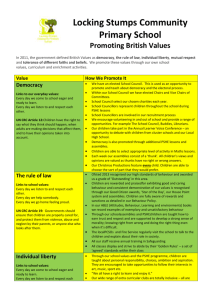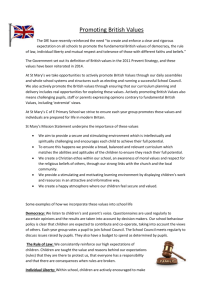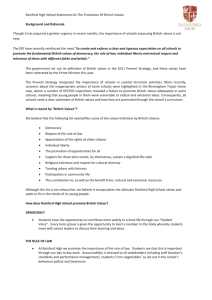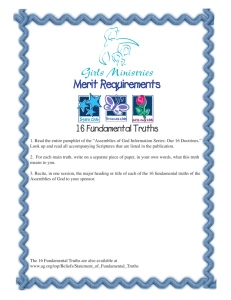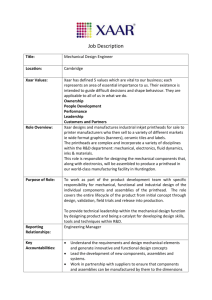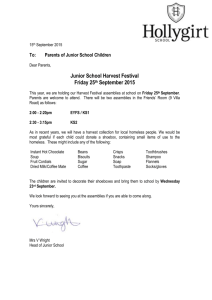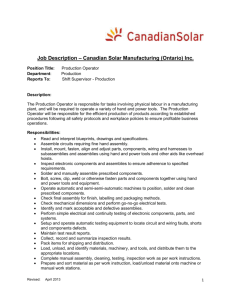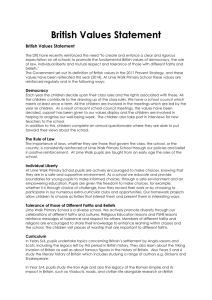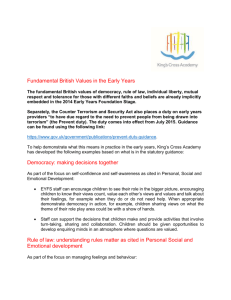Evidencing British Values Rakegate Primary School
advertisement
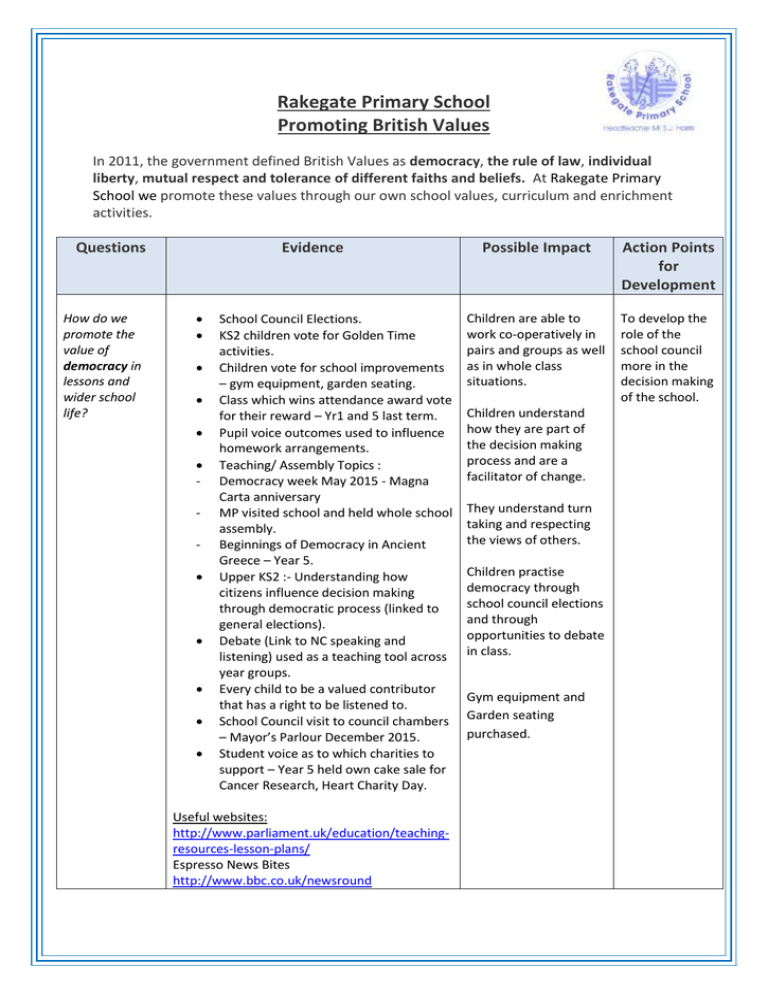
Rakegate Primary School Promoting British Values In 2011, the government defined British Values as democracy, the rule of law, individual liberty, mutual respect and tolerance of different faiths and beliefs. At Rakegate Primary School we promote these values through our own school values, curriculum and enrichment activities. Questions How do we promote the value of democracy in lessons and wider school life? Evidence School Council Elections. KS2 children vote for Golden Time activities. Children vote for school improvements – gym equipment, garden seating. Class which wins attendance award vote for their reward – Yr1 and 5 last term. Pupil voice outcomes used to influence homework arrangements. Teaching/ Assembly Topics : Democracy week May 2015 - Magna Carta anniversary MP visited school and held whole school assembly. Beginnings of Democracy in Ancient Greece – Year 5. Upper KS2 :- Understanding how citizens influence decision making through democratic process (linked to general elections). Debate (Link to NC speaking and listening) used as a teaching tool across year groups. Every child to be a valued contributor that has a right to be listened to. School Council visit to council chambers – Mayor’s Parlour December 2015. Student voice as to which charities to support – Year 5 held own cake sale for Cancer Research, Heart Charity Day. Useful websites: http://www.parliament.uk/education/teachingresources-lesson-plans/ Espresso News Bites http://www.bbc.co.uk/newsround Possible Impact Action Points for Development Children are able to work co-operatively in pairs and groups as well as in whole class situations. To develop the role of the school council more in the decision making of the school. Children understand how they are part of the decision making process and are a facilitator of change. They understand turn taking and respecting the views of others. Children practise democracy through school council elections and through opportunities to debate in class. Gym equipment and Garden seating purchased. How do we promote the value of the rule of law in lessons and wider school life? Themed assembly week on Rule – September 2015. School behaviour policy with clear sanctions and rewards. Home/ school agreements – signed every September. Class charters – set up every September by the children. Year 5 & 6 Children have roles of Peer Supporters on the playgrounds at lunchtime. Visits to schools from public services (e.g. PCSOs/police/fire service/cycle wardens). Visit to Safeside – Year 5. E Safety/Cyber bullying – taught through the curriculum and assemblies during E-Safety week. Children learn in history how our country’s rules were developed and how they reflect the beliefs and values of the period. Year 6 compare and contrast laws in Victorian times and now. Year 6 consider and contrast how different countries are ruled during World War 2. Year 5 consider the rules of Slavery in Ancient Greece. Children can articulate how and why we need to behave in school and demonstrate they understand and can abide by rules. Hold further Emergency Services Days in School to promote different rules of law. The behaviour of the children is extremely good/improving. Incidences of serious misbehaviour are very low/ falling. Useful websites: Espresso News Bites http://www.bbc.co.uk/newsround How do we promote the value of individual liberty in lessons and wider school life? Through SEAL/ PSHE children are taught about personal responsibility, choices, ambition and aspiration. Nursery children have choice of toys/activities they would like out for the week. SEAL has specific units around individual liberty such as ‘Good to be Me’. Children encouraged to take opportunities to follow their interests in art, music, sport through the curriculum and a wide variety of extra-curricular clubs. Sports day held every year – July, Music & Sports reward assemblies held every year – July. Children are given the opportunity to celebrate their out of school achievement during Monday assemblies. Children understand the importance of accepting responsibility and their right to be heard in school. Children demonstrate independence of thought and action. Children take part in a variety of extracurricular clubs. Children with challenging behaviour have less incidents of aggressive behaviour. Develop opportunities for teaching Year 5 & 6 children the UN Rights of the Child. Peripatetic music lessons offered to KS2 children – brass, strings & woodwind. Children taught to keep themselves safe including on-line through E safety assemblies, E safety week, PSHE lessons outside agencies e.g. NSPCC assembly & Y5/6 workshops. Useful websites: http://www.oxfam.org.uk/education/resources/ childrens-rights http://www.unicef.org.uk/Education/Resources -Overview/Resources/ How do we promote the value of mutual respect in lessons and wider school life? Children learn that their behaviour has an effect on their own rights and those of others. Differences between people such as faith, ethnicity, disability, gender or sexuality and differences of family situations are discussed through PSHE and assemblies. A disability assembly is held annually involving staff and children from a local Special School. Disability workshops are held involving staff and children from a local Special School. Children from a local Special School complete Work Experience across the school. Through assemblies and themed days/weeks we celebrate Black History Month, Respect for the fallen (Christmas Truce activities), Remembrance Day (Poppies are sold in school, assemblies and 2 minutes silence) and themed food. Year 6 study World War 2 and visit the Cenotaph in London and the National Memorial Arboretum . We recognise different First Languages through: signs around school, first language books in library and International week. Charity action by schools – Macmillan, Race for Life, Heart Foundation, Children in Need, Comic/Sport Relief, Barnados, British Legion, Compton Hospice and donations to The Well, local Food Bank. Children demonstrate respect for themselves and others in their general conduct and care for one another. Pupils are able to explain how they show respect to others and how they feel about it for themselves. School linking/ twinning across schools with different demographics Visit local libraries and promote a sense of belonging to your local community. An International week is held annually in July to celebrate different cultures and beliefs. School choir perform at Carol Services and Residential Care Homes. Useful websites: http://www.schoolslinkingnetwork.org.uk/res ources-area/ http://www.gogivers.org/ http://www.preventforschools.org/ How do we promote the value of tolerance of different faiths & beliefs in lessons and wider school life? How do we challenge opinions or behaviours that are contrary to fundamental British values? Through RE Curriculum, follow the LA guidance. Visits to and from different faith groups/ places of worship. Year 1 visit Church of the Epiphany, Year 2 visit Gurdwara, Yr 4 email Rabbi, Year 5 visit Lichfield Cathedral. Focus weeks to learn about life & cultures of other countries e.g. Olympics, Football Word Cup, Chinese New Year. Discussions around prejudice and prejudice based bullying. Value the diverse ethnic/religious backgrounds of all our pupils and families and undertake a variety of events and lessons to celebrate these. Children are able to articulate why respect and tolerance are important. Children are able to talk about the different faiths and cultures they learn about, ask questions and show tolerance and respect for others of different faiths and religions. Invite more faith leaders in school to lead assemblies/RE lessons. Invite the people in our diverse community to share their faith and beliefs in school. We will actively challenge pupils, staff or parents expressing opinions or behaviours that are contrary to fundamental British values, including ‘extremist views’. Prevent/ Extremism written into the school’s safeguarding policy. Staff/ governor training around British Values/Prevent. Book list to incorporate British Values into literacy: http://www.schoolslinkingnetwork.org.uk/resources-area/words-language/activities-book-list/
